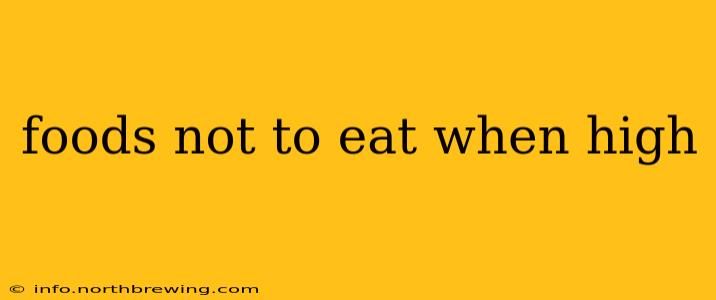Getting the munchies when high is a common experience, but not all foods are created equal when it comes to enhancing or hindering your high. Indulging in the wrong foods can lead to unwanted side effects, from digestive upset to increased anxiety. This guide explores foods to avoid when high and offers healthier alternatives to satisfy those cravings. We'll also tackle some frequently asked questions to give you a comprehensive understanding of mindful munching.
What are the worst foods to eat when high?
This is a crucial question, as the wrong food choices can negatively impact your experience. Generally, foods high in saturated fat, sugar, and processed ingredients are less desirable when you're already experiencing altered perception and potentially heightened sensitivity. These can lead to feelings of sluggishness, nausea, or even exacerbate anxiety. Greasy, heavily processed fast food is a prime example. While the immediate gratification might seem appealing, the aftereffects can be far less enjoyable.
What foods should I avoid if I'm prone to anxiety?
Anxiety is a common concern for some individuals when high. Certain foods can exacerbate this feeling. Caffeine and sugary foods, for instance, can increase your heart rate and lead to jitters, worsening feelings of anxiety. Opting for calming, less stimulating foods is recommended in these cases.
What are some healthier alternatives to typical "munchies" foods?
Instead of reaching for the greasy pizza or bag of chips, consider healthier alternatives that will nourish your body without negatively impacting your high. Fruits and vegetables offer natural sugars and essential nutrients. A handful of grapes, some berries, or a sliced apple can satisfy sweet cravings without the sugar crash. Hummus with vegetables or a small portion of whole-grain crackers provide complex carbohydrates and fiber for sustained energy.
Are there any foods that can actually help counteract negative effects?
While no food can completely negate the effects of cannabis, certain options can help mitigate some negative experiences. Foods rich in Omega-3 fatty acids, found in fatty fish like salmon, or foods high in magnesium, like leafy greens, can have calming effects and potentially help manage anxiety. Staying hydrated is also essential; water helps to regulate body temperature and can alleviate some of the dryness associated with cannabis use.
Can certain foods intensify the high?
The impact of food on your high is complex and varies from person to person. However, foods high in fat content can sometimes prolong the effects of cannabis. This is because fat-soluble cannabinoids can be absorbed more slowly, potentially extending the duration of your experience. This isn't necessarily a negative, but it's important to be aware of it.
Is it okay to eat something heavy while high?
Eating heavy meals while high can lead to digestive discomfort. Your body's perception of satiety might be altered, leading you to overeat and experience indigestion or nausea. It's generally recommended to opt for lighter, easily digestible foods when your senses are heightened.
What should I avoid if I have a sensitive stomach?
Individuals with sensitive stomachs should be particularly mindful of their food choices when high. Spicy foods, greasy foods, and heavily processed items are likely to cause digestive upset. Sticking to blander, easily digestible foods like plain rice, toast, or bananas can be helpful.
What are some good snacks to have on hand for when I get the munchies?
Preparing ahead of time can make all the difference. Keep a stash of healthy snacks readily available: fruits, vegetables, yogurt, nuts, or even a pre-made salad. Having these options at the ready can help you make healthier choices when cravings hit.
This guide offers insights into mindful munching. Remember that individual experiences vary; pay attention to your body and make choices that support your well-being. Always consume cannabis responsibly and within the legal framework of your location.
